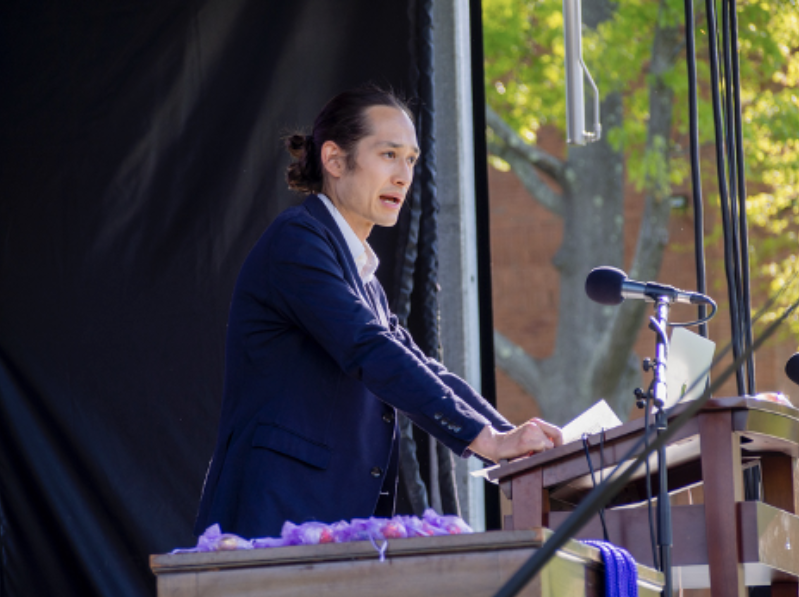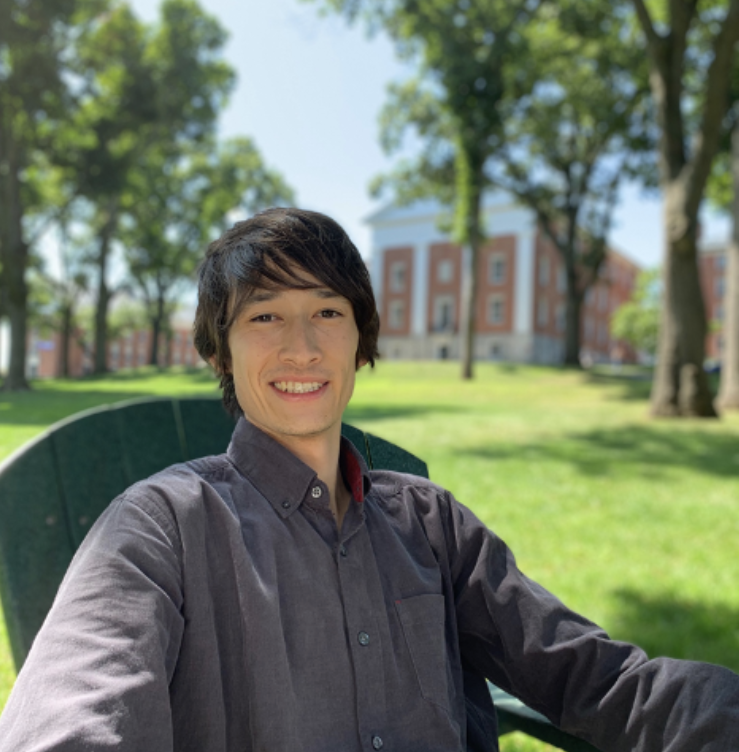Toma-Jin Morikawa-Fouquet: An Interdisciplinary Thinker and Empathetic Leader


In the words of his thesis advisor (Professor of Political Science Thomas Dumm), Toma-Jin Morikawa ’21, also known as Toma-Jin Morikawa-Fouquet, is “a brilliant example of a new generation of Amherst students with a truly international perspective.” Born in France but raised in the U.S. and Japan, Morikawa-Fouquet has had no shortage of opportunities to develop that international perspective and observe cross-cultural interactions, becoming increasingly interested in the moments of crisis that can cause “the most severe forms of conflict” between and within cultures and states.
At Amherst, Morikawa-Fouquet has channeled his interest in the international world, cross-cultural communication and community-building into numerous endeavors. As president of the college’s Transfer Student Association he has helped develop a “really tight-knit community” of students from across the world. As the Association of Amherst Students (AAS) Senator elected by the school’s transfer students he has been able to advocate for “transfers’ interests, on and off campus,” whether by “facilitating the integration of new transfer students into a campus made particularly difficult to navigate by Covid-19” or by holding events for them.
In the classroom, Morikawa-Fouquet’s time at Amherst has been equally impressive. As a political science major, Morikawa-Fouquet put together an impressive thesis questioning traditional assumptions about structural theories of international relations. As an anthropology major, he has found ways to move away from strictly quantitative visions of culture.
Coming to Amherst
Before coming to Amherst, Morikawa-Fouquet spent three and a half years enrolled in Kyoto’s Doshisha University. Founded by the Protestant missionary Joseph Hardy Neesima (Amherst College’s first Japanese alumnus), Doshisha University grew from relatively small origins into one of Japan’s most prestigious universities. At Doshisha, Morikawa-Fouquet threw himself into studying international relations, hoping to eventually work as a diplomat where his “kind of multicultural background could contribute to international peace.”
It wasn’t long before Morikawa-Fouquet secured an internship at Japan’s Ministry of Foreign Affairs — an experience he described as simultaneously rewarding and disillusioning. Despite being tasked with interesting work, he said that the push to represent Japan as a country and its national interests made “all of [his] other identities feel kind of marginalized … it made [him] realize that, maybe, government isn’t really what [he] wanted to do.”
Briefly dispirited, Morikawa-Fouquet quickly bounced back when he reflected upon his study abroad experience at U.C. Berkeley in 2018. He described one of the major intellectual turning points of his life as a course he took there called “Language and Power,” which he recalled as his “favorite class in [his] undergraduate career.” While he originally enrolled in it as an “outlier course,” Morikawa-Fouquet found himself immersed in and fascinated by a new way of thinking. He recalls that the course not only enabled him to see the discipline of international relations as a discourse, but also granted him the means to examine the lives of everyday people and the ways in which language shapes our understanding of identity, culture and power. The class also led Morikawa-Fouquet towards a fascination with the French philosopher Michel Foucault, which would fully bloom when he began to write his thesis.
His time at U.C. Berkeley also inspired Morikawa-Fouquet to “transfer to an American institution, especially a liberal arts college where [he] could explore more classes and get rich feedback on [his] work.” As a result, he applied for and was selected to transfer into Amherst College in the fall of 2019 through a program that allows one student from Doshisha per year to enroll at Amherst College.

Leadership in the Transfer Student Community
Transitioning to Amherst wasn’t an easy process. A forty-hour trip featuring a grim ten-hour layover in Seattle was a fairly inauspicious omen, but a more significant challenge was the small cohort of transfers in the 2019-2020 school year. “There were only like 16 people or so transferring in the fall, and like six in the spring,” Morikawa-Fouquet pointed out, and most returning students “already had their own friend groups.” As he found his feet and adjusted to the college as a whole, Morikawa-Fouquet found the transfer community to be an extremely helpful pillar of support — a perception that would later make him determined to help maintain the tight-knit nature of the transfer community.
Michael Keating ’22, another transfer student who lived in Seligman Dormitory during the 2019-2020 school year, is one of the many friends Morikawa-Fouquet gained through the transfer student community. Although Keating’s first impression was that Morikawa-Fouquet seemed “pretty shy,” the pair grew closer through further interactions. “We kept bumping into each other in the hallways, and I was quickly swept away by the energy of his internal life and creativity,” Keating said. Keating further remarked that “Amherst talks a lot about producing free thinkers … but Jin is really unique in his ability to perceive and challenge status quos.”
Morikawa-Fouquet got his chance to do just that in the summer of 2020, when he was elected joint president of the transfer students’ association and began the task of helping new transfer students integrate into the Amherst environment. While this job was made particularly difficult to navigate by the Covid-19 pandemic, Morikawa-Fouquet says that he had one especially important advantage when it came to this task: As an international student, he stayed on campus over the summer of 2020 and was able to see many of the changes Amherst made before the new school year kicked off. As a result, he had an increased ability to guide new transfer students through the unfamiliar systems and set up events in accordance with Amherst’s new policies that would help develop group bonding.
At the same time, summer 2020 also saw Morikawa-Fouquet elected into the AAS Senate as the first-ever holder of a new seat voted on exclusively by transfer students. While he regrets that all of his AAS meetings had to be held over Zoom, Morikawa-Fouquet is proud to have spent a year representing the interests of Amherst’s transfer community.
A Thesis Challenging Existing Assumptions
Beyond his increasing leadership in the transfer student community, Morikawa-Fouquet also spent summer 2020 in a state of intense introspection. “I mean, there were only 40 or 50 students on campus — most of whom I did not know,” he remarked. Morikawa-Fouquet pointed out that this was an environment very well suited to prompting “a period of self-reflection.”
“I spent a lot of time thinking alone [on] Charles Pratt[‘s] third floor just about what I wanted to do and what I wanted to get out of my time here.” Increasingly, he thought about branching away from his focus on international relations and ultimately decided to declare a second major in anthropology, a decision that helped him develop a more qualitative and less quantitative perspective on the humanities.
As he began to engage more with anthropology, Morikawa-Fouquet also decided to write a senior thesis in the political science department that tied together many of his experiences in political science and international relations. Morikawa-Fouquet’s first thesis idea was to visit Princeton University’s archives and conduct research into President Dwight Eisenhower’s nuclear policy towards East Asia. When the Covid-19 pandemic nixed that plan, Morikawa-Fouquet stayed positive, identifying an opportunity to write a more personal thesis capturing his “initial fascination with the discipline of North American international relations theory, but also [his] later disappointment with it.” He added that he wanted this thesis to encapsulate “[his] encounter with Michel Foucault in the Language and Power Class at U.C. Berkeley,” which played such a significant role in Morikawa-Fouquet’s disaffection with certain elements of the field of international relations.
To capture this experience, Morikawa-Fouquet moved his thesis into the realm of political theory, began working with Professor Dumm as a thesis advisor and continued reading intensely to hone his ideas. Dumm reflected on the process fondly, praising Morikawa-Fouquet’s intellectual sharpness, curiosity and upbeat spirit: “In a sentence, he is the sort of student I looked forward to meeting over Zoom every week — which isn’t always the case.”
Ultimately, Morikawa-Fouquet’s thesis took shape as a critique of prominent structuralist descriptions of international relations which assume that “anarchy is a natural structure [and an] inevitable result of the Westphalian state system.” One example that Morikawa-Fouquet critiques is Kenneth N. Waltz, a prominent structuralist scholar who framed the study of international relations by heavily drawing from the language of economics. While Waltz claims that his theories are merely descriptions of the reality of international relations with predictive capabilities, Morikawa-Fouquet identifies “an implicit logic that makes his theory normative — which means it describes what Waltz thinks states ought to do [in the anarchical system].” Morikawa-Fouquet demonstrates how Waltz moved from the descriptive to the normative by using and expanding on Foucault’s ideas. Drawing from Foucault’s idea of governmentality, Morikawa-Fouquet shows how Waltz discursively invokes (via economic metaphors) international anarchy as a realm that is endowed with structural rules, which in turn generates implications for how a state ought to conduct policy.
Next Steps
In the aftermath of this monumental year at Amherst, Morikawa-Fouquet is looking forward to a break. “This summer,” he smiled, “I’m just going to take it easy. I’m going to fly back to Japan — because I haven’t been back in a year and a half — And I’m just going to spend time with my grandparents and read things that are interesting.”
After that, Morikawa-Fouquet has lined up a one-year Master’s program in Japanese Studies at Oxford University. As a Clarendon scholar, Oxford will cover all of his tuition and living expenses. From there on, all sorts of possibilities are open. Professor Dumm projected a bright future for Morikawa-Fouquet: “In twenty years I can see him in a lot of places. He has the talents to be a top international diplomat or a highly respected professor, where he goes next is up to him.”
Whatever happens next, there can be no doubt that Morikawa-Fouquet’s time at Amherst has left a strong impression on the college, both through his vibrant intellectual activities and through his leadership and persistent community building.





Comments ()